大学英语2 翻译说课材料
新一代大学英语2课文翻译

About 2,400 years ago in Athens a man was put to death for askingtoo many questions. There were philosophers before him, but it was with Socrates that a the subject really took off. If philosophy has a patron saint it is Socrates.大约是2,400 年以前,在雅典,有一个人因为问了太多问题被判了死刑。
在他之前,也有许多哲学家,可哲学这门学科却是从他——苏格拉底开始,才进入一个真正腾飞的阶段。
苏格拉底之于哲学,就是一位引路和守护的圣人。
As a young man he had been a brave soldier fighting in the Peloponnesian War against the Spartans and their allies.In middle age he shuffled around the marketplace, stopping people from time to time and asking them awkward questions. That was more or less all he did. But the questions he asked were razor-sharp. They seemed straightforward; but they weren’t.年轻时的苏格拉底曾是一名勇敢的战士,参与了伯罗奔尼撒战争,抵御斯巴达人及其盟军。
到了中年,他在市集随处走动,时不时拦下路人,问他们一些难以回答的问题。
他差不多就只干这个。
但他的问题都很犀利,看似简单直白,实际却不好回答。
The word “philosopher” comes from the Greek words meaning “love of wisdom”. The Western tradition in philosophy spread from ancient Greece across large parts of the world, at time cross-fertilized by ideas from the East. The kind of wisdom that it values is based on argument, reasoning and asking question, not on believing things simply because someone important has told you they are true. Wisdom for Socrates was not knowing lots of facts, or knowing how to do something. It meant understanding the true nature of our existence, including the limits of what we can know. Philosophers today are doing more or less what Socrates was doing: asking tough questions, looking at reasons and evidence, struggling to answer some of the most important question we can ask ourselves about the nature of reality and how we should live.“哲学家”一词(philosopher)来源于希腊语,意思是“对智慧的热爱”。
大学英语教材二课文翻译
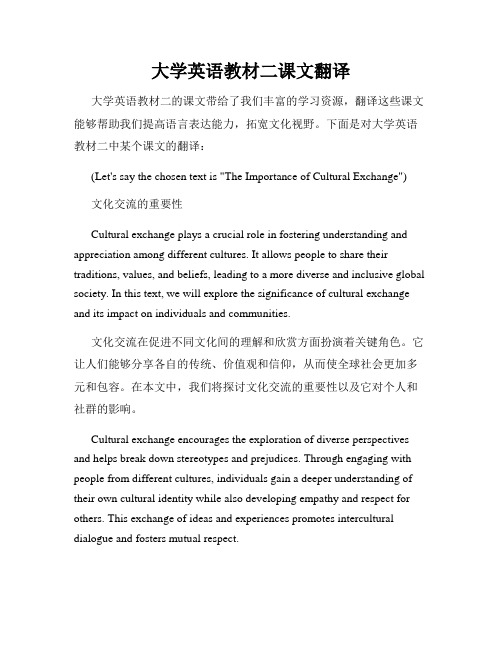
大学英语教材二课文翻译大学英语教材二的课文带给了我们丰富的学习资源,翻译这些课文能够帮助我们提高语言表达能力,拓宽文化视野。
下面是对大学英语教材二中某个课文的翻译:(Let's say the chosen text is "The Importance of Cultural Exchange")文化交流的重要性Cultural exchange plays a crucial role in fostering understanding and appreciation among different cultures. It allows people to share their traditions, values, and beliefs, leading to a more diverse and inclusive global society. In this text, we will explore the significance of cultural exchange and its impact on individuals and communities.文化交流在促进不同文化间的理解和欣赏方面扮演着关键角色。
它让人们能够分享各自的传统、价值观和信仰,从而使全球社会更加多元和包容。
在本文中,我们将探讨文化交流的重要性以及它对个人和社群的影响。
Cultural exchange encourages the exploration of diverse perspectives and helps break down stereotypes and prejudices. Through engaging with people from different cultures, individuals gain a deeper understanding of their own cultural identity while also developing empathy and respect for others. This exchange of ideas and experiences promotes intercultural dialogue and fosters mutual respect.文化交流鼓励探索不同的观点,并有助于消除刻板印象和偏见。
新编大学英语2口语考试材料及翻译
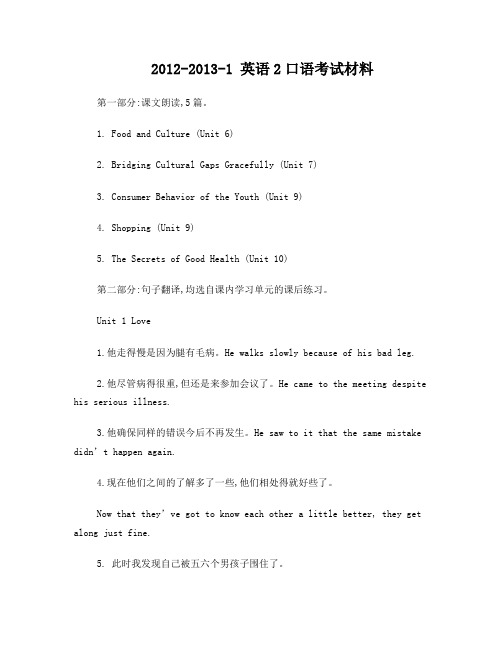
2012-2013-1 英语2口语考试材料第一部分:课文朗读,5篇。
1. Food and Culture (Unit 6)2. Bridging Cultural Gaps Gracefully (Unit 7)3. Consumer Behavior of the Youth (Unit 9)4. Shopping (Unit 9)5. The Secrets of Good Health (Unit 10)第二部分:句子翻译,均选自课内学习单元的课后练习。
Unit 1 Love1.他走得慢是因为腿有毛病。
He walks slowly because of his bad leg.2.他尽管病得很重,但还是来参加会议了。
He came to the meeting despite his serious illness.3.他确保同样的错误今后不再发生。
He saw to it that the same mistake didn’t happen again.4.现在他们之间的了解多了一些,他们相处得就好些了。
Now tha t they’ve got to know each other a little better, they get along just fine.5. 此时我发现自己被五六个男孩子围住了。
Then I found myself surrounded by half a dozen boys.6.在这幸福的时刻,我向你致以最美好的祝愿。
I send you my best wishes on this happy occasion. Unit 2 Communication Problem7.昨天我去牙科医生那儿将我的一颗蛀牙拔掉了。
I went to the dentist yesterday to have a bad/decayed tooth pulled out.8.事物的发展从根本上讲是由内因决定的。
大学生英语教材2课文翻译
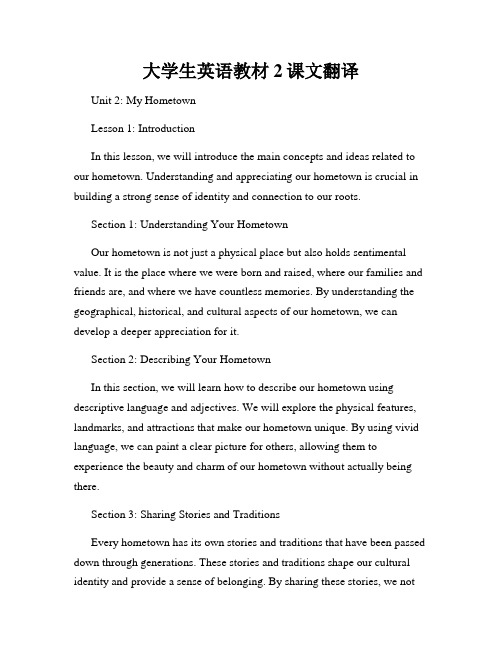
大学生英语教材2课文翻译Unit 2: My HometownLesson 1: IntroductionIn this lesson, we will introduce the main concepts and ideas related to our hometown. Understanding and appreciating our hometown is crucial in building a strong sense of identity and connection to our roots.Section 1: Understanding Your HometownOur hometown is not just a physical place but also holds sentimental value. It is the place where we were born and raised, where our families and friends are, and where we have countless memories. By understanding the geographical, historical, and cultural aspects of our hometown, we can develop a deeper appreciation for it.Section 2: Describing Your HometownIn this section, we will learn how to describe our hometown using descriptive language and adjectives. We will explore the physical features, landmarks, and attractions that make our hometown unique. By using vivid language, we can paint a clear picture for others, allowing them to experience the beauty and charm of our hometown without actually being there.Section 3: Sharing Stories and TraditionsEvery hometown has its own stories and traditions that have been passed down through generations. These stories and traditions shape our cultural identity and provide a sense of belonging. By sharing these stories, we notonly preserve our heritage but also give others a glimpse into the rich history of our hometown.Section 4: Comparing HometownsIn this section, we will compare our hometowns with those of our classmates. By understanding the similarities and differences, we can broaden our perspective and gain a better understanding of the world. This exercise encourages cultural exchange and fosters a deep appreciation for diversity.Lesson 2: My Hometown's HistoryIn this lesson, we will delve deeper into the historical aspect of our hometowns. Learning about the historical events and figures that have shaped our hometowns helps us develop a better understanding of our heritage.Section 1: Historical TimelineWe will create a historical timeline of our hometown, starting from its foundation to the present day. By examining key events and influential figures, we can see how our hometown has evolved over time. This exercise highlights the importance of preserving historical records and cherishing our cultural heritage.Section 2: Historical LandmarksEvery hometown has historical landmarks that serve as a reminder of its past. We will explore these landmarks, their significance, and how theycontribute to the overall identity of our hometown. By appreciating these landmarks, we can develop a sense of pride and inspire others to do the same.Section 3: Local Legends and HeroesMany hometowns have their own local legends and heroes, whose stories have become a part of their folklore. We will explore these legends and heroes, discovering the values they embody and the lessons they teach. By celebrating these figures, we ensure that their legacies are not forgotten and continue to inspire future generations.Lesson 3: Celebrating Our HometownIn this lesson, we will focus on the various festivals, traditions, and celebrations that take place in our hometown. These cultural events not only provide entertainment but also serve as a platform for preserving and promoting our local traditions.Section 1: Festivals and CelebrationsWe will explore the different festivals and celebrations that are unique to our hometown. By understanding the significance behind these events, we can actively participate and promote them to ensure their continuity. These festivals provide an opportunity for locals and visitors alike to come together and experience the vibrancy of our hometown's culture.Section 2: Local CuisineFood plays a significant role in any culture, and our hometown's cuisine is no exception. We will showcase the distinctive dishes and culinary traditions that are native to our hometown. By sharing these recipes andstories, we can introduce our hometown's flavors to a wider audience and keep our culinary heritage alive.Section 3: Traditional Arts and CraftsTraditional arts and crafts are an integral part of our hometown's cultural heritage. We will explore the various artistic mediums and craftsmanship that have been passed down through generations. By showcasing these talents, we can preserve our traditional arts and crafts and support local artisans.ConclusionUnderstanding and celebrating our hometown is a way to honor our roots and preserve our cultural heritage. By exploring its history, traditions, and attractions, we can develop a stronger sense of identity and foster a connection to our homeland. Let us embrace and share the beauty of our hometowns, allowing others to appreciate their uniqueness and fostering a sense of unity and cultural exchange.。
英语笔译说课稿范文

英语笔译说课稿范文尊敬的各位评委老师,大家好。
今天我将就英语笔译课程进行说课。
一、课程概述英语笔译是英语专业学生必修的一门课程,旨在培养学生的英语语言能力,提高其翻译技巧和跨文化交际能力。
通过本课程的学习,学生将能够理解并运用各种翻译策略,处理不同类型的文本,并在实际工作中进行有效的笔译工作。
二、教学目标1. 掌握基本的翻译理论和技巧。
2. 能够熟练地进行英汉互译。
3. 增强对文化差异的认识和理解。
4. 提高批判性思维和独立解决问题的能力。
三、教学内容1. 翻译理论:介绍翻译的定义、分类、标准以及翻译过程中的常见问题。
2. 翻译技巧:教授直译、意译、增译、减译等基本翻译技巧。
3. 文本类型:分析不同类型的文本(如文学、科技、商务等)的翻译方法。
4. 文化因素:探讨文化差异对翻译的影响,以及如何在翻译中处理文化元素。
5. 实践练习:通过大量的笔译练习,让学生将理论知识应用于实践。
四、教学方法1. 讲授法:对翻译理论进行系统讲解。
2. 案例分析法:分析经典翻译案例,让学生理解翻译策略的应用。
3. 小组讨论:鼓励学生就特定翻译问题进行小组讨论,培养团队合作精神。
4. 角色扮演:模拟翻译场景,让学生在角色扮演中体验翻译过程。
5. 反馈与评价:对学生的翻译作业进行及时反馈,帮助他们发现并改正错误。
五、教学资源1. 教材:选用权威的翻译教材,如《新编英语翻译教程》。
2. 辅助材料:包括专业词典、在线翻译资源、翻译软件等。
3. 多媒体工具:利用PPT、视频等多媒体工具辅助教学。
六、教学评价1. 平时作业:定期布置翻译作业,检验学生的学习效果。
2. 期中考核:通过模拟翻译任务,评估学生的翻译能力和理解力。
3. 期末考试:包括理论知识测试和翻译实践考核。
4. 学生反馈:收集学生对课程的意见和建议,不断优化教学内容和方法。
七、教学反思在教学过程中,我将不断反思教学方法和内容,确保教学活动的有效性,并根据学生的反馈进行调整。
大学英语2单元课文翻译教学教材

大学英语2单元课文翻译1.When the going gets tough, the tough take accounting. When the job marketworsens, many students calculate they can’t major in English or history. (Para. 1)当形势变得困难时,强者会去选学会计。
当就业市场恶化时,许多学生估算着他们不能在主修英语或历史。
2.In other words, a college education is more and more seen as a means foreconomic betterment rather than a means for human betterment. This is a trend that is likely to persist and even accelerate. (Para. 2)换言之,大学教育越来越被看成是改善经济而不是提升人类自身的手段。
这种趋势可能会持续,甚至有加快之势。
3.Over the next few years, as labor markets struggle, the humanities will probablycontinue their long slide in succession. (Para. 3)在未来几年内,遇有劳动力市场的不景气,人文科学可能会持续其长期低迷的状态。
4.Once the dominant pillars of university life, the humanities now play little roleswhen students take their college tours. These days, labs are moved vivid and compelling than libraries. (Para. 3)而今在学生们参观校园的时候,却知识一个小点缀。
大学英语翻译2知识讲解
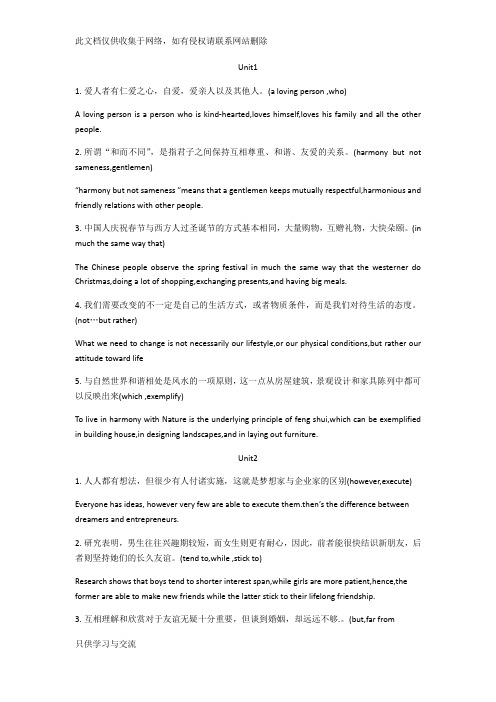
Unit11.爱人者有仁爱之心,自爱,爱亲人以及其他人。
(a loving person ,who)A loving person is a person who is kind-hearted,loves himself,loves his family and all the other people.2.所谓“和而不同”,是指君子之间保持互相尊重、和谐、友爱的关系。
(harmony but not sameness,gentlemen)“harmony but not sameness ”means that a gentlemen keeps mutually respectful,harmonious and friendly relations with other people.3.中国人庆祝春节与西方人过圣诞节的方式基本相同,大量购物,互赠礼物,大快朵颐。
(in much the same way that)The Chinese people observe the spring festival in much the same way that the westerner do Christmas,doing a lot of shopping,exchanging presents,and having big meals.4.我们需要改变的不一定是自己的生活方式,或者物质条件,而是我们对待生活的态度。
(not…but rather)What we need to change is not necessarily our lifestyle,or our physical conditions,but rather our attitude toward life5.与自然世界和谐相处是风水的一项原则,这一点从房屋建筑,景观设计和家具陈列中都可以反映出来(which ,exemplify)To live in harmony with Nature is the underlying principle of feng shui,which can be exemplified in building house,in designing landscapes,and in laying out furniture.Unit21.人人都有想法,但很少有人付诸实施,这就是梦想家与企业家的区别(however,execute)Everyone has ideas, however very few are able to execute them.then’s the difference between dreamers and entrepreneurs.2.研究表明,男生往往兴趣期较短,而女生则更有耐心,因此,前者能很快结识新朋友,后者则坚持她们的长久友谊。
Lecture2中英文字幕

Unit6 Go shoppingLecture2 Sales and promotionHello, everybody.大家好In this session we are going to focus on the main idea and structure of our text on p.78.这节课我们主要来讲解一下78页课文的大意及文章结构。
Do you know how to find out the main idea of an article?你们知道如何找出文章的大意么?Let’s watch a video clip to figure it out.让我们来看一段视频短片What have you learnt from the video clip?从这段视频中你们学到了什么?To find out the main idea, we should try to find the topic.想找出文章的大意我们应该先找到文章的主题Repeating words in the text can help us to find the topic.文章中重复出现的词有助于我们找出文章的主题Look! What are the repeating words in our text?看!这篇课文中重复出现的词是什么?As we can see technique and response are repeated many times in the text.正如我们所看到的,technique和response是课文中重复出现的词。
Response means the way to resist the techniques ,response在这篇文章中的意思是应对促销手段的方法so the main idea of the text is sales techniques and the ways to resist the techniques.所以这篇文章的大意就是促销手段和应对方法A sales technique is a selling method that is used by a sales person or sales team to make money and help sell more effectively.促销手段是销售人员或销售团队为了赚钱或卖出更多商品而采取的销售策略The way to resist the techniques means the way to fight against the sales techniques.应对方法是指应对这些促销手段的方法。
新编大学英语2课文翻译(完整版)

新编大学英语2课文翻译(完整版)善良之心,久久相依 ................................... 当时我没有意识到,是爸爸帮我保持平衡奥古斯塔斯 ? J ? 布洛克1 随着我渐渐长大,当别人看见我和爸爸在一起,我会觉得很尴尬。
他身材矮小,走起路来跛得很厉害。
我们一起走时,他要把手搭在我的肩上才能保持平衡,人们就会盯着我们看。
对这种不必要的注意我觉得非常难堪。
他也许曾注意到,或着觉得烦恼,但他从来没有流露出来。
2 要协调我们的步伐并不容易,他(的步子)一瘸一拐的,我(走起来)则缺乏耐心。
因此,我们走路的时候并不怎么说话。
但出发时,他总是说:“你定步伐,我会尽量跟上。
”3 我们通常在家和地铁之间来往,这是他上班的必由之路。
不论生病还是碰到恶劣的天气他都去上班,几乎没有旷过一天工。
即使别人无法上班,他也要去办公室。
对他来说这是一种自豪。
4 当地上有冰或雪的时候,即使有人帮忙他也无法走路。
这时,我或者我的姐妹就用孩子玩的雪撬拉着他,穿过纽约布鲁克林的街道,直到地铁的入口处。
一到那儿,他就能紧紧抓住扶手一直走下去, 地铁道里比较暖和,下面的楼梯不结冰。
曼哈顿的地铁站正好是他办公楼的地下室,因此除了从布鲁克林我们去接他的地方到回家为止,他都不用再出去。
5 一个成年男子要有多少勇气才能承受这种屈辱和压力,我现在想来惊讶不已。
他从没有痛苦或抱怨,他是怎么做到这一步的我感到不可思议。
6 他从不把自己当作同情的对象,也从不对更幸运的或更能干的人表示任何嫉妒。
他在别人身上所寻找的是一颗“善心”。
如果他找到了一颗善心,那么有这么颗心的人对他来说就是一位大好人了。
7 由于年龄的增长,我相信那是一种用来判断人的恰当的标准,尽管我还不能精确地知道什么是一颗“善心”。
但是,当我自己没有的时候,我是知道的。
8 尽管很多活动我爸爸不能参加,但他还是尽量用某种方式参与。
当本地的一支棒球队发现缺经理的时候,他使它维持下去。
全新版大学英语第二版综合教程2课文及翻译

全新版大学英语第二版综合教程2课文及翻译《全新版大学英语第二版综合教程 2 课文及翻译》大学英语学习对于当代大学生来说至关重要,而全新版大学英语第二版综合教程 2 则是众多英语教材中的经典之作。
这本教程中的课文涵盖了丰富多样的主题,从人文社科到自然科学,从日常生活到国际事务,为学生提供了广阔的知识视野和语言学习素材。
在课文方面,它精心挑选了一系列具有代表性和启发性的文章。
比如,有讲述友谊真谛的篇章,通过细腻的描写和生动的故事,让我们深刻体会到真正的友谊是如何在困难时刻给予支持和温暖。
还有探讨科技发展对社会影响的内容,使我们能够思考科技进步带来的利弊,以及如何在科技浪潮中保持清醒的头脑和正确的价值观。
其中一篇关于文化差异的课文给我留下了深刻的印象。
作者通过对比不同国家的风俗习惯、思维方式和社交礼仪,让我们清晰地看到文化的多样性和复杂性。
这种对比不仅增加了我们对世界的了解,也培养了我们的跨文化交流意识和能力。
在阅读这些课文的过程中,我们不仅能够提高英语语言能力,还能够拓宽自己的思维和视野,丰富自己的知识储备。
而对于课文的翻译,更是起到了辅助理解和语言学习的重要作用。
翻译部分准确、流畅,能够帮助我们更好地理解原文的意思。
在翻译过程中,我们可以学习到不同的翻译技巧和方法,比如直译、意译、音译等。
通过对比原文和译文,我们还能够体会到中英两种语言在表达方式、语法结构和词汇运用上的差异。
例如,在某个描述自然风光的段落中,原文使用了大量生动形象的词汇和修辞手法来描绘美景。
翻译时,译者巧妙地运用了汉语中优美的词汇和句式,将那种美丽和壮观的景象完美地呈现出来,让我们在欣赏美景的同时,也感受到了语言的魅力。
然而,在学习课文及翻译的过程中,我们也会遇到一些挑战。
对于一些复杂的长难句,理解和翻译起来可能会比较困难。
这就需要我们仔细分析句子结构,抓住句子的主干和核心意思,逐步攻克难关。
同时,一些专业术语和文化背景知识的缺乏也可能会影响我们对课文的理解。
新视野大学英语2翻译课件
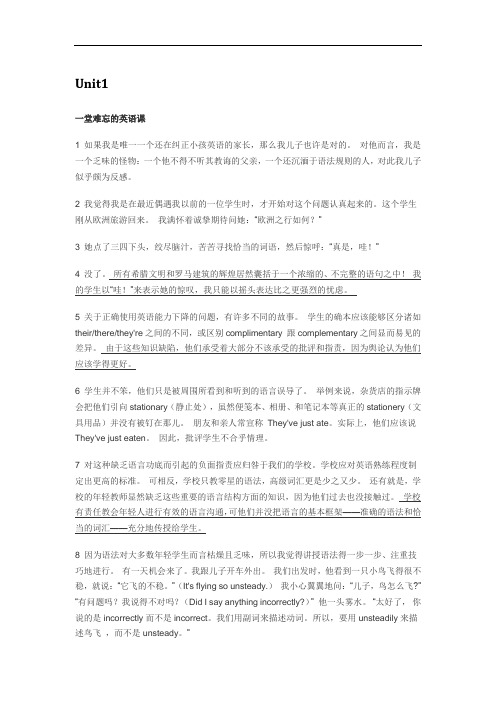
Unit1一堂难忘的英语课1 如果我是唯一一个还在纠正小孩英语的家长,那么我儿子也许是对的。
对他而言,我是一个乏味的怪物:一个他不得不听其教诲的父亲,一个还沉湎于语法规则的人,对此我儿子似乎颇为反感。
2 我觉得我是在最近偶遇我以前的一位学生时,才开始对这个问题认真起来的。
这个学生刚从欧洲旅游回来。
我满怀着诚挚期待问她:“欧洲之行如何?”3 她点了三四下头,绞尽脑汁,苦苦寻找恰当的词语,然后惊呼:“真是,哇!”4 没了。
所有希腊文明和罗马建筑的辉煌居然囊括于一个浓缩的、不完整的语句之中!我的学生以“哇!”来表示她的惊叹,我只能以摇头表达比之更强烈的忧虑。
5 关于正确使用英语能力下降的问题,有许多不同的故事。
学生的确本应该能够区分诸如their/there/they're之间的不同,或区别complimentary 跟complementary之间显而易见的差异。
由于这些知识缺陷,他们承受着大部分不该承受的批评和指责,因为舆论认为他们应该学得更好。
6 学生并不笨,他们只是被周围所看到和听到的语言误导了。
举例来说,杂货店的指示牌会把他们引向stationary(静止处),虽然便笺本、相册、和笔记本等真正的stationery(文具用品)并没有被钉在那儿。
朋友和亲人常宣称They've just ate。
实际上,他们应该说They've just eaten。
因此,批评学生不合乎情理。
7 对这种缺乏语言功底而引起的负面指责应归咎于我们的学校。
学校应对英语熟练程度制定出更高的标准。
可相反,学校只教零星的语法,高级词汇更是少之又少。
还有就是,学校的年轻教师显然缺乏这些重要的语言结构方面的知识,因为他们过去也没接触过。
学校有责任教会年轻人进行有效的语言沟通,可他们并没把语言的基本框架——准确的语法和恰当的词汇——充分地传授给学生。
8 因为语法对大多数年轻学生而言枯燥且乏味,所以我觉得讲授语法得一步一步、注重技巧地进行。
大学英语2课文翻译

大学英语2课文翻译引言大学英语2课程是大学英语系列课程的一部分,旨在帮助学生提高英语听说读写的能力。
课程中的课文是为了让学生更好地理解和运用英语而选取的。
本文将为大家提供大学英语2课文的翻译。
第一课:《脑力发展与创新思维》原文The human brain is divided into two halves, so-called because they are roughly symmetrical. The left hemisphere controls the right side of the body and vice versa. It is generally believed that the right hemisphere is the seat of creativity and the left hemisphere is responsible for logical thinking. Both sides are needed, of course, to function in daily life and a balance is usually struck between them.翻译人脑分为两半,因为它们大致是对称的而得名。
左半球控制身体的右侧,反之亦然。
人们普遍认为右半球是创造力的源泉,而左半球负责逻辑思维。
当然,在日常生活中,这两个部分都是必需的,通常会在它们之间保持平衡。
第二课:《关于梦》原文Dreams are often nonsense, although they may be based on actual experiences. They have been described as the mind’s way of putting together random information gathered during the day. Everyone dreams, often several times a night, although the dreams are usually forgotten. There is debate about whether dreams have a deeper meaning or if they are simply the result of brain activity during sleep.翻译梦通常是无意义的,尽管它们可能基于实际经验。
全新版大学英语第二版综合教程2课文及翻译

全新版大学英语第二版综合教程2课文及翻译全新版大学英语第二版综合教程 2 是许多大学生在英语学习道路上的重要教材。
这本教程的课文涵盖了丰富多样的主题,从日常生活到学术研究,从文化传统到社会现象,为学生提供了广阔的知识视野和语言学习素材。
在“Unit 1 Ways of Learning”中,课文通过讲述一位父亲试图教导儿子骑自行车的经历,探讨了不同的学习方式和理念。
父亲坚持按照自己的方法指导儿子,却未能成功。
最终儿子通过自己的摸索和尝试,掌握了骑车的技巧。
这篇课文让我们明白,每个人都有适合自己的学习方式,有时候放手让学习者自己去探索和尝试,可能会取得更好的效果。
“Unit 2 Values”里的课文则聚焦于价值观的讨论。
通过描述不同人物在面对利益和道德抉择时的表现,引导学生思考什么是真正重要的价值观。
例如,在商业世界中,是追求短期的利润最大化,还是坚守诚信和社会责任?这样的思考有助于学生在成长过程中树立正确的价值观,做出符合自己内心信念的选择。
“Unit 3 The Generation Gap”探讨了代际之间的差异和沟通问题。
课文中描绘了父母与子女在观念、生活方式和目标追求上的种种不同,以及由此产生的矛盾和冲突。
然而,也指出了通过理解、尊重和积极的沟通,代际之间可以跨越鸿沟,建立更加和谐的关系。
在翻译这些课文时,需要准确把握原文的意思,同时要考虑到中英文语言习惯和文化背景的差异。
例如,在一些具有特定文化内涵的词汇和表达上,不能简单地进行字面翻译,而要进行适当的解释和转换,以使译文更符合目标语言的读者的理解。
以“Unit 4 The Virtual World”中的一段为例:“The Internet has transformed how we communicate, do business, and access information Ithas opened up a world of possibilities, but it has also brought along new challenges and concerns” 翻译为“互联网改变了我们交流、做生意和获取信息的方式。
全新版大学英语综合教程2课文翻译解读

全新版大学英语综合教程2课文翻译AppendⅡChinese Translations of Texts A (Units 1-8)参考译文第一单元学习方式课文A哈佛大学教育学教授霍华德·加德纳回忆其中国之行,阐述他对中西方不同的学习方式的看法。
中国式的学习风格霍华德·加德纳1987年春,我和妻子埃伦带着我们18个月的儿子本杰明在繁忙的中国东部城市南京住了一个月,同时考察中国幼儿园和小学的艺术教育情况。
然而,我和埃伦获得的有关中蓁教育观念差异的最难忘的体验并非来自课堂,而是来自我们在南京期间寓居的金陵饭店的大堂。
我们的房门钥匙系在一块标有房间号的大塑料板上。
酒店鼓励客人外出时留下钥匙,可以交给服务员,也可以从一个槽口塞入钥匙箱。
由于口子狭小,你得留神将钥匙放准位置才塞得进去。
本杰明爱拿着钥匙走来走去,边走边用力摇晃着。
他还喜欢试着把钥匙往槽口里塞。
由于他还年幼,不太明白得把钥匙放准位置才成,因此总塞不进去。
本杰明一点也不在意。
他从钥匙声响中得到的乐趣大概跟他偶尔把钥匙成功地塞进槽口而获得的乐趣一样多。
我和埃伦都满不在乎,任由本杰明拿着钥匙在钥匙的槽口鼓捣。
他的探索行为似乎并无任何害处。
但我很快就观察到一个有趣的现象。
饭店里任何一个中国工作人员若在近旁,都会走过来看着本杰明,见他初试失败,便都会试图帮忙。
他们会轻轻握紧本杰明的手,直接将它引向钥匙的槽口,进行必要的重新定位,并帮他把钥匙插入槽口。
然后那位“老师”会有所期待地对着我和埃伦微笑,似乎等着我们说声谢谢——偶尔他会微微皱眉,似乎觉得我俩没有尽到当父母的责任。
我很快意识到,这件小事与我们在中国要做的工作直接相关:考察儿童早期教育(尤其是艺术教育)的方式,揭示中国人对创造性活动的态度。
因此,不久我就在与中国教育工作者讨论时谈起了钥匙槽口一事。
两种不同的学习方式我的中国同行,除了少数几个人外,对此事的态度与金陵饭店工作人员一样。
《英语翻译二》课件

Introduction to English Translation II CourseBasic knowledge of English translationEnglish Translation PracticeEvaluation and Feedback of English Translation II CourseOutlook on English Translation II Course
Incremental practice opportunities
05
Outlook on English Translation II Course
Incrementally professional: As the field of English translation continues to develop, the courseware will become more professional, covering more advanced translation theories and techniques
Curriculum revision
Incrementing practice opportunities can help students improve their translation skills This can include providing more translation exercises, holding regular translation workshops, and sourcing students to participate in translation projects outside of class
全新版大学英语第二版综合教程2课文翻译
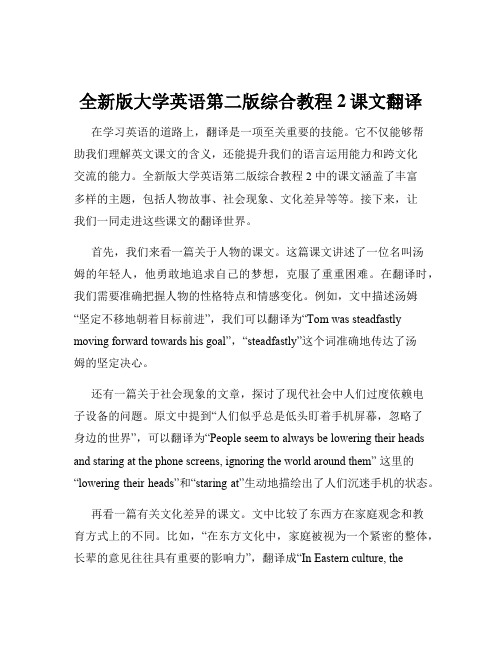
全新版大学英语第二版综合教程2课文翻译在学习英语的道路上,翻译是一项至关重要的技能。
它不仅能够帮助我们理解英文课文的含义,还能提升我们的语言运用能力和跨文化交流的能力。
全新版大学英语第二版综合教程 2 中的课文涵盖了丰富多样的主题,包括人物故事、社会现象、文化差异等等。
接下来,让我们一同走进这些课文的翻译世界。
首先,我们来看一篇关于人物的课文。
这篇课文讲述了一位名叫汤姆的年轻人,他勇敢地追求自己的梦想,克服了重重困难。
在翻译时,我们需要准确把握人物的性格特点和情感变化。
例如,文中描述汤姆“坚定不移地朝着目标前进”,我们可以翻译为“Tom was steadfastly moving forward towards his goal”,“steadfastly”这个词准确地传达了汤姆的坚定决心。
还有一篇关于社会现象的文章,探讨了现代社会中人们过度依赖电子设备的问题。
原文中提到“人们似乎总是低头盯着手机屏幕,忽略了身边的世界”,可以翻译为“People seem to always be lowering their heads and staring at the phone screens, ignoring the world around them” 这里的“lowering their heads”和“staring at”生动地描绘出了人们沉迷手机的状态。
再看一篇有关文化差异的课文。
文中比较了东西方在家庭观念和教育方式上的不同。
比如,“在东方文化中,家庭被视为一个紧密的整体,长辈的意见往往具有重要的影响力”,翻译成“In Eastern culture, thefamily is regarded as a close entity, and the opinions of the elders often carry significant influence” 这个翻译准确地体现了东方文化中家庭的特点。
Unit 5 Dreams新编大学英语第二版第二册课文翻译教学内容

Unit 5 DreamsAre You a Dreamer?1 Dreams — why do we have them? Do they mean anything? Is there such a thing as a dream in which the events seen by the dreamer come true? Such questions have interested people for thousands of years. Scientific advances in the past few decades have revealed more about the physical process of sleep, but they still don't offer any final answers to the many questions about dreams that continue to puzzle us.2 Everyone dreams—it's just that some of us can't remember doing so. Recordings of human brain waves show that we all go into dream mode when we fall asleep. We dream for most of the night, but we're only able to remember our dreams if we happen to wake up while we are still in REM (Rapid Eye Movement) sleep. This is when we dream. We have four or five REM stages of sleep during the night, the first occurring about 90 minutes after we fall asleep. After that, our dreaming periods recur every 90 minutes and last between 15 to 45 minutes, getting longer as the night progresses.3 The main purpose of sleeping (apart from giving us rest) may be to allow us to dream—to review our lives, our worries and hopes in a totally different way, and to get an unconscious view of ourselves, getting rid of material from our memories that we no longer need.4 Some dreams may have a simple physiological cause. Dreaming of walking on hot coals, for example, may well be caused by sleeping with your feet too close to a heater. And the frustrating dream in which you try to run but your legs won't move may be explained by bedding that is too tight. Anyone who sleeps through their alarm may well dream of doorbells or telephones ringing. All are simple examples of how the unconscious works with our conscious mind to guide and advise us.5 But such physiological explanations are not enough to tell us why we dream. Some people believe that dreams are total nonsense, merely the result of the misfiring of electrical impulses in the brain, while on the other hand, some read great importance into even the simplest of dreams.6 Some dreams reflect inner fears that are instantly recognizable. Dreaming of losing your job or house can reflect real fears, even if they are only subconscious. Most of us have dreamed that we had to take a final exam for a difficult course, which we had never taken, or in which we had done poorly.7 But what of the dreams that do not have such an obvious meaning? For centuries, both men and women have sought the answers in so-called dream dictionaries, possibly the oldest of which dates back to 5000 BC. According to these dictionaries, a dream aboutdrinking wine meant a short life, whereas a dream about drinking water predicted a long life.8 By AD 200, dream dictionaries had lost none of their popularity, and the ancient Greek Artemidorus wrote a five-volume interpretation of more than 3,000 dreams, listing such symbols as right hand (meaning father), left hand (meaning mother), and dolphin (a good omen).9 Today, there are countless books offering dream interpretations in libraries and bookshops. They're as popular as ever with dream enthusiasts, but most experts warn that they should be read with care. Psychoanalyst and author Kenneth Saunders explains, "Dreams are closely tied up with an individual's mind and analysis is so open to mistakes or errors. I believe you can only discover the true meaning of a dream if you know the person who had the dream."你做梦吗?1 梦,我们为什么会做梦?梦有意义吗?真的有梦中所见的事成为现实这种事吗?几千年来这些问题一直让人们感兴趣。
- 1、下载文档前请自行甄别文档内容的完整性,平台不提供额外的编辑、内容补充、找答案等附加服务。
- 2、"仅部分预览"的文档,不可在线预览部分如存在完整性等问题,可反馈申请退款(可完整预览的文档不适用该条件!)。
- 3、如文档侵犯您的权益,请联系客服反馈,我们会尽快为您处理(人工客服工作时间:9:00-18:30)。
Unit oneA、1) 约翰同时干许多事情。
我觉得他应当休息一下。
(work on, all at once, take a break) John works on many things all at once. I think he should take a break.2) 杨教授说的话有着神奇的力量。
许多同学接受他的忠告,开始专注学业了。
(what, magical, advice, focus on)What Prof. Yang said has magical power. On his advice, many students began to focus on their schoolwork.3) 由于星期天晚上汤姆没有提示他将做何种选择,我无法弄清楚他会如何完成这项任务。
(clue, option, figure out, accomplish)As Tom gave no clue Sunday night about which option he would choose, I can’t figure out how he will accomplish the task.4) 我的父亲是极负责任的人。
虽然他总是很忙,但他设法每天都给家庭留出一些时间。
(responsibility, on the go, set aside)My father is a man of great responsibility. Though he is on the go all the time, he manages to set aside some time for the family every day.5) 这个项目的成功与否取决于我们如何确定轻重缓急。
(project, depend on, priority)The success of the project depends on how we set our priorities.6) 在计算机商店里,我的朋友建议我们先试一下光碟播放机再决定买哪个。
(try out, settle on)At the computer store, my friend suggested that we try out the video players before we settle on any one of them.7) 我觉得在确定轻重缓急前,把要做的事情全都写下来,是有道理的。
(make sense, write down, set)I think it makes sense to write down everything we need to do before we set priorities.8) 如果我们不及时交论文,会有什么后果?(turn in, on time, consequence)If we do not turn in our papers on time, what will be the consequence?B、1)Although Magellan didn’t live to celebrate,he is remembered today as the leader of the first around-the-world journey in history.虽然麦哲伦没有活着回来庆祝,但今天人们仍把她作为历史上第一次环球航行的领袖记得他。
2)Around 90% of the scientific journals are written in English.大约90%的科学期刊是用英语出版的。
3)How much will you be paid for delivering them(newspapers)?你送报纸得到多少钱的报酬?4)If a price is set too high, though, many people may refuse to buy a product.但如果价格定得太高,许多人也许就不愿购买产品了。
5)In July 2005, London was chosen as the host city for the 2012 Olympic Games.2005年7月,伦敦被选为2012年奥运会主办城市。
6)Smoking is known to increase a person’s risk of developing lung cancer.我们∕大家知道吸烟会增加患肺癌的危险。
Unit twoA、1) 文章交上来之前,务必仔细检查一遍。
(make sure, review, hand/turn in)Make sure you review your paper carefully before you hand/turn it in.2) 自从我最后一次见到他,5年过去了。
他已长成一个高大的小伙子了。
(go by, grow into)Five years have gone by since I last saw him. He has grown into a tall young man.3) 老师要求学生们详细描述他们在展览会(exhibition)上看到的一切。
(require, in detail)The teacher required the students to describe in detail what they saw at the exhibition.4) 坐在我前面的两个学生窃窃私语,我很难把注意力集中在老师身上。
(whisper, pay attention to)It’s hard to pay attention to the teacher when the two students sitting in front of me are whispering to each other.5) 他对篮球的喜爱至少可以追溯到1970年代。
在他十几岁的时候,他就表现出对这项运动强烈的兴趣。
(go back to, show interest in)His love of basketball goes back at least to the 1970s. When he was a teenager, he showed intense interest in the sport.6) 杰克打定主意创办自己的公司。
然而,要筹集足够的款项在某种意义上讲是一件麻烦事。
(make up one’s mind, something of a, struggle, raise money for)Jack made up his mind to start his own business. However, it has been something of a struggle to raise enough money for it.7) 小男孩费力地把礼品盒打开。
当他看到里面的玩具汽车时,兴奋地大叫起来。
(take pains, exclaim)The little boy took great pains to open his gift. When he saw the toy car inside, he exclaimed with excitement.8) 出色的老师能对学生的生活产生很大的影响,无论学生本身多么可厌。
(excellent, make a difference, unpleasant)Excellent teachers can make a big difference in the lives of their students, no matter how unpleasant the student may seem.B、1)None of the ships had accurate maps or clocks.没有一艘船有精确的地图和时钟。
2)But installing a green roof can’t be done without a lot of planning and information.但安装绿色屋顶没有大量的规划和信息是无法完成的。
3)Working is not always convenient, and there will be times when you’d prefer to be doing something else.工作不总是方便的,有时候宁可做别的事。
4)There’s nothing unusual about this man’s appearance.此人的外表没什么特别。
∕没什么与众不同。
5)The teacher didn’t think that was a realistic dream for a young boy.那位老师认为对年幼的男孩来说,那不是一个现实的梦想。
∕那是一个不现实的梦想。
6)The blow is more than words can tell.这打击非言语能表达。
Unit threeA、1) 就我看来,现在的房地产问题不会给该国的经济带来太严重的影响。
(as far as…, impact)As far as I can see, the current real estate problems won’t have too large an impact on the country’s economy.2) 每次我们队遇到问题,我们的队长都能很快想出解决的办法。
(every time, come up with, solution)As far as I can see, the current real estate problems won’t have too large an impact on the country’s economy.3) 他不但不觉得开心,反而说晚会上喧闹的人群让他厌烦。
(rather than, be fed up with)Rather than feeling happy, he said that he was fed up with the party’s noisy crowd.4) 这些年他真心实意地做出了很多努力,现在当然也应该成功了。
(sincere efforts, deserve) He has made a lot of sincere effort over the years and certainly deserves to succeed now.5) 家族传统教育他要客观合理地看待人生,所以他很少感到沮丧。
